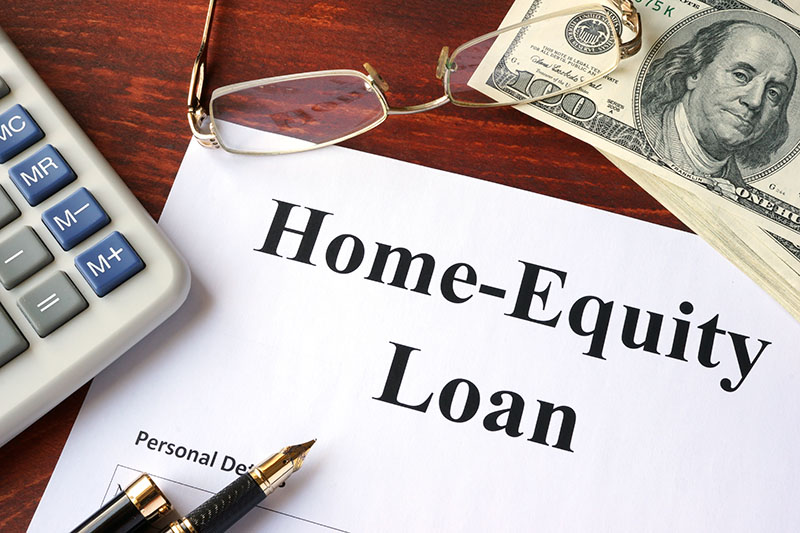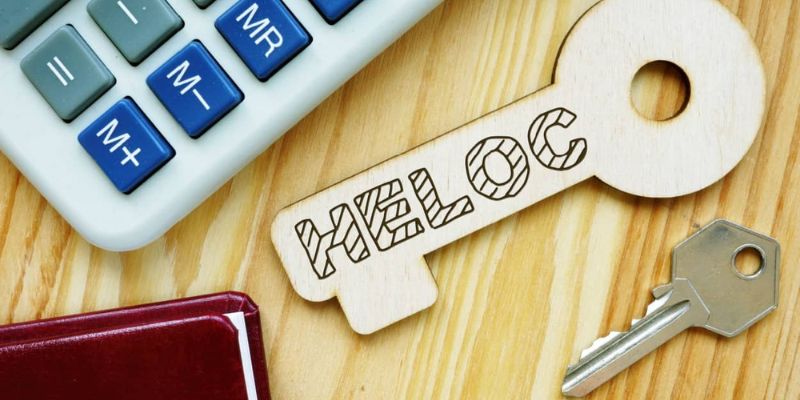How to Get Home Equity Loan with Bad Credit
Oct 16, 2023 By Susan Kelly
Home equity loans can be an attractive source of funds for people with bad credit who need extra cash to finance a large purchase or consolidate debt. Homeowners often get home equity loans since the interest rate is typically lower than other loan options.
Additionally, tapping your home equity gives you access to more money at a fixed and lower cost than unsecured personal loans and credit card advances.
But is it possible to get a home equity loan with bad credit? The answer is yes - you can secure financing in several ways, even if your credit score isn't perfect. In this blog post, we'll provide tips on how to get approved for a home equity loan with bad credit so that you can make the best decision for your financial future.
How to Qualify for a Home Equity Loan with Bad Credit
Getting a home equity loan with bad credit is possible, though it may be more challenging than obtaining one with good credit. There are certain steps that you can take to improve your chances of securing financing despite your poor credit rating.
First and foremost, it’s important to establish how much home equity you have available before seeking out a loan. This will give you an idea of the amount you can borrow while also helping potential lenders gauge your ability to repay the loan.
Additionally, it’s recommended that borrowers looking for a home equity loan with bad credit should get their financial documents in order before applying for financing. This includes gathering information on income, assets, debts, and expenses. Having these documents ready will help show lenders that you’re serious about getting a loan and demonstrates an ability to manage your finances.
When applying for a home equity loan with bad credit, you may need to provide a co-signer willing to take responsibility if you default on the loan. This person must have good credit and understand the risks of signing such an agreement.
Steps to Apply for a Home Equity Loan with Bad Credit
- Gather information about your mortgage interest rate, loan amount, and term.
- Estimate your home equity value by subtracting the current mortgage balance from the estimated market value of your home.
- Look into lenders that offer home equity loans for people with bad credit scores.
- Consider a co-signer if you need help finding a lender willing to provide financing with one.
- Gather financial documents such as income statements and recent tax returns before applying for a loan.
- Compare offers from multiple lenders to get the best rates and terms available for your needs.
- Read the fine print in any loan agreement you sign carefully before proceeding.
- Ensure you have an emergency fund to cover the loan payments if your income fluctuates or disappears.
- Ensure all payments are made on time monthly to avoid penalties and maintain a good credit score.
Following these steps will help increase your chances of getting approved for a home equity loan with bad credit, although there’s no guarantee that it will be successful. It is important to remember that these loans come with risks and should not be taken lightly. Do thorough research before making any final decisions and ensure you can comfortably meet the repayment terms.
Pros and Cons of a Home Equity Loan with Bad Credit
Pros
- Access to a larger amount of funds than other loan options.
- Lower interest rates than unsecured personal loans and credit cards.
- Longer repayment terms were often available to help reduce monthly payments.
- Tax deductions are possible depending on the state you live in and your financial situation.
- No pre-payment penalties if you can pay off the loan early, saving money on interest charges over time.
- Opportunity to improve your credit score if all payments are made on time each month for the loan term.
- It can be used for any purpose, such as paying off high-interest debt or financing a large purchase like a car or home renovation project.
- Fixed repayment terms of up to 30 years are available, allowing for more budgeting flexibility.
- Funds can be accessed quickly if approved and promptly completed the paperwork.
- No collateral is required since your home equity secures the loan.
Cons
- Difficult to obtain with bad credit as lenders may be hesitant to approve such loans due to the higher risk of defaulting on payments.
- Not all states allow homeowners to take out a home equity loan with bad credit, so it’s important to check local laws before applying.
- Higher interest rates than traditional mortgages or other secured loans due to the increased risk of defaulting on payments.
- A home appraisal is often required before the loan is approved, which can be expensive and time-consuming for the borrower.
- If you fail to make payments on the loan, your house can be foreclosed upon as it was used as collateral for the loan.
Can I get a HELOC with bad credit?
Whether you can get a HELOC with bad credit depends on several factors, such as the value of your home, the amount you are looking to borrow, and your financial situation. Typically, lenders will require applicants to have a minimum credit score 680 to qualify for a HELOC; however, those with lower scores may still be approved if they provide additional information demonstrating their ability to repay the loan.
Ultimately, reputable lenders should be willing to work with borrowers with bad credit and discuss available options. It's always important to do research before applying for any type of loan so that you understand all of the risks involved.
Alternatives to Home Equity Loans with Bad Credit
1. Peer-to-Peer Loans
You can obtain These online loans through websites like LendingClub or Prosper. The interest rates on these loans will depend on your credit score, but they typically offer lower rates than home equity loans for borrowers with bad credit.
2. Credit Union Loans
Credit unions often provide more flexible loan options and repayment terms than traditional banks and lenders. They may also be willing to work with borrowers with bad credit scores, so it’s worth exploring this option if you cannot secure a home equity loan.
3. Secured Personal Loans
If you own an asset, such as a car or boat, you can use it as collateral to secure a loan. This can be a great option for those with bad credit since the asset serves as security for the lender, reducing their risk.
FAQs
Is it possible to get a home equity loan with bad credit?
Yes, getting a home equity loan with bad credit is possible. However, you should understand the risks involved and shop for the best rates and terms before signing any agreement.
How to use home equity with a low credit score?
Using your home equity with a low credit score is risky and can have serious financial consequences, such as foreclosure. It’s important to understand the risks involved before taking out any type of loan, especially one that uses your home as collateral. You should also look into other financing options, such as peer-to-peer or secured personal loans, if you have bad credit, since these may be more beneficial in the long run.
What is the average credit score needed for a home equity loan?
The average credit score needed for a home equity loan typically ranges from 620 to 680. However, this number can vary depending on the lender and the type of loan you are applying for. Some lenders may require a higher credit score or additional financial information to approve your application.
Conclusion
Home equity loans are a great way to finance large purchases or consolidate debt, but they can be difficult to obtain with bad credit. It is important to understand the risks involved before taking out any type of loan and research to find the best option for your financial situation. Additionally, you should always ensure that you have an emergency fund in place to cover loan payments if your income changes or disappears and that all payments are made on time each month.

Unlocking the World of Credit Card Travel Portals
Curious about credit card travel portals? Discover how to make the most of them in our simplified guide. From booking to benefits, we've got you covered.
Nov 23, 2023 Susan Kelly

Andrew W. Mellon: Visionary Leader and Generous Benefactor
Explore the enduring legacy of Andrew W. Mellon, from his impact on finance to his commitment to philanthropy.
May 04, 2024 Triston Martin

Exploring the Cutting-Edge Role of AI in Finance: 7 Transformative Examples
7 transformative examples of AI in finance in 2024. Explore how artificial intelligence is reshaping financial services, from risk management to personalized banking
Sep 12, 2024 Sid Leonard

Competition between Credit Risk and Interest Rate Risk
Two main dangers are associated with bond investments: credit risk and interest rate risk. High-interest-risk bonds fluctuate in value in response to interest rate movements and perform badly while rates increase. Credit risk is the possibility that investors won't get back all or part of the money they put in. If you want your portfolio to succeed, you need to diversify to protect against both of these threats
Jan 28, 2024 Triston Martin

Can I Purchase A Car Using A Credit Card?
It is possible to buy a car with a credit card, although it may only sometimes be the most practical or cost-effective option. Some car dealerships may accept credit cards, but they may charge a processing fee. Credit cards typically have higher interest rates than car loans, so if you cannot pay off the balance in full each month, you may pay more in interest over time. It is essential to carefully consider the card's terms and the potential fees and interest charges before using a credit card to buy a car.
Oct 28, 2023 Triston Martin

529Plan Made Simple: Your Guide to College Savings
Find how to save for college effortlessly with our comprehensive guide to 529 plans and college savings strategies.
Mar 13, 2024 Susan Kelly